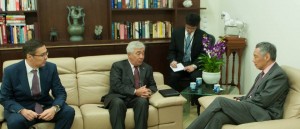SINGAPORE – Beginning his tour of Southeast Asia, Kazakhstan Minister of Foreign Affairs Erlan Idrissov paid a visit to Singapore on Aug. 28 to improve bilateral relations and discuss the further expansion of trade and economic and investment cooperation.
 The main areas of cooperation between the two countries include public services, e-government, education, budget planning and support for small and medium-sized businesses.
The main areas of cooperation between the two countries include public services, e-government, education, budget planning and support for small and medium-sized businesses.
During the visit, Idrissov met with Prime Minister of Singapore Lee Hsien Loong and Minister of Foreign Affairs and Minister of Justice Kasiviswanathan Shanmugam.
Lee Hsien Loong is also Chairman of the Board of the Government Investment Corporation, which is one of the world’s largest sovereign wealth funds. His wife, Ho Ching is the General Director of the investment holding Temasek, which manages the majority of the largest corporations in Singapore. Temasek’s story is similar to how Kazakhstan’s Samruk Kazyna National Welfare Fundwas created. Singapore is a country that has been successful in its socio-economic development and ability to actively adapt like Kazakhstan.
During the meetings, Kazakhstan-Singapore relations and prospects for further cooperation in trade, economic and investment cooperation were discussed. The two sides exchanged views on issues of regional importance and discussed cooperation within international organisations.
Idrissov welcomed the arrival of Singaporean companies in Kazakhstan’s market. He mentioned the active engagement of Jurong Consultants, which is involved in the development of chemical clusters in Kazakhstan. The National Export and Investment Agency Kaznex Invest and Jurong Consultants have developed special economic zones (SEZ) in Kazakhstan under the Kazakh industrialisation programme. He also highlighted the work of the joint venture Keppel Kazakhstan, which builds barges and drilling units for Kazakhstan’s oil and gas industry.
The parties also talked about cooperation in the sphere of education and science, which has become a staple of cooperation between Singapore and Kazakhstan. A good example of this mutually beneficial cooperation is the strategic partnership between Nazarbayev University and the Lee Kuan Yew School of Public Policy.
In Singapore, Idrissov also spoke at the Lee Kuan Yew School of Public Policy on Eurasian integration and gave an interview to the Singaporean press. The title of his speech was “The Eurasian Economic Union (EEU) and Its Implications for Asia.”
He explained the idea of the EEU as well as its objectives and benefits.
“Accession to the EEU serves the economic interests of Kazakhstan. The EEU offers great economic potential to Kazakhstan’s economy, providing access to a common market of over 170 million people,” he said.
Idrissov stressed that the Eurasian common market has significant potential over the next two decades, with experts predicting a 25 percent growth in the member states’ gross domestic product by 2030, which equates to over $600 billion. Since the creation of the Customs Union (CU), trade between Russia, Kazakhstan and Belarus has increased by 47 percent, exceeding $24 billion in 2013 (before joining the CU in 2009, it was only $12.9 billion).
According to Idrissov, regarding Kazakhstan’s membership in the CU and the Common Economic Space (CES), there has been an almost twofold increase in trade turnover, exports and imports between 2009 and 2013. In that time period, turnover has gone from $72 billion to $133 billion, exports from $43 billion to $83 billion and imports from $28 billion to $49 billion.
“The EEU will have no impact on Kazakhstan’s or other member states’ bilateral or international relations or agreements and neither will Kazakhstan’s integration into other organisations. The EEU respects the sovereignty of its member states,” the minister said during his remarks as he explained the benefits of the EEU for foreign companies and their cooperation with Kazakhstan.
Today, Singapore is an important political and trade partner of Kazakhstan in South-East Asia. Diplomatic relations between the two republics were established on March 30, 1993.
